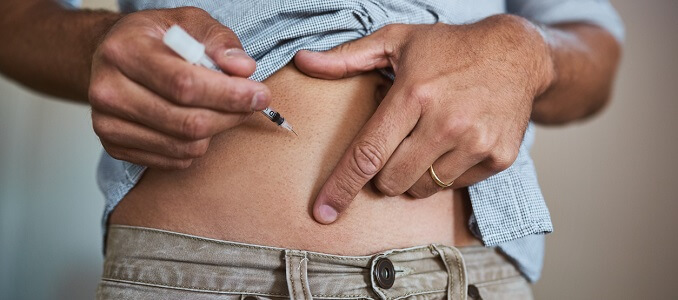Human Growth Hormone Replacement Therapy
Human growth hormone (HGH) replacement therapy is prescribed to treat patients with growth hormone deficiency.
Hormones like HGH play a vital role in your health and wellness. HGH may very well be one of your body’s most important hormones.
Human growth hormone, or HGH, is secreted by the pituitary gland. HGH plays an essential role in growth, cellular regeneration, and cellular reproduction. As such, it stimulates and/or regulates many of your body’s most critical processes.
What is HGH Therapy?
HGH therapy is a prescription medication used to return the HGH levels in the blood to normal in patients whose bodies are not making enough growth hormone. HGH therapy is only available with a doctor’s prescription. Human growth hormone replacement therapy is only given via injection. All HGH injections contain the prescription drug somatropin. There are several different brands or types of prescription somatropin available. They differ only in their available dosages, storage instructions, and delivery methods. Some HGH injections use traditional syringes, and others use more sophisticated injectable devices.
Human growth hormone (HGH) replacement therapy is prescribed to treat patients with growth hormone deficiency.
What is HGH Deficiency?
Growth hormone deficiency (GHD) is a medical condition that is caused when your body is not producing adequate amounts of human growth hormone (HGH). HGH is produced and released by the pituitary gland. Growth hormone deficiency in children can be caused by damage to the pituitary gland or another gland called the hypothalamus. There are several diseases or genetic conditions that can cause growth hormone deficiency in children. A child is at greater risk for HGH deficiency if he or she has any of these:
- Brain injury
- Brain tumor
- Radiation treatment to the head
However, GHD in children can occur even when none of these risk factors are present.
GHD in adults most commonly persists from an untreated or ineffectively treated growth hormone deficiency in childhood. However, it can also develop in adulthood without any previous history of GHD. In adults under the age of 40, growth hormone deficiency is most likely the continuation of a GHD from childhood. Growth hormone deficiency in adults over the age of 40 is probably due to the regular drop in HGH levels that occur as we age. This is often referred to as “adult-onset” or “age-related growth hormone deficiency.
Growth hormone deficiency in adults can cause several health issues. Low levels of growth hormone reduce your body’s ability to burn fat. The primary symptoms of adult-onset growth hormone deficiency are problems related to “body composition.” This is because the patient will almost always be struggling with increased fat mass and decreased muscle mass. Other signs and symptoms listed in the guidelines for adults with GHD include:
- Low libido and sexual health issues
- Lack of energy
- Increased sensitivity to cold
- Increased insulin resistance
- Increased cholesterol and increased build-up of cardiac plaque, putting the patient at increased risk of cardiovascular disease
- Mood swings, increased anxiety, and depression
- Problems with memory and cognition
- An overall sense of being unwell
The most common cause of growth hormone deficiency in adults is the steady decline of HGH that occurs as we age.
How Do I Know if I Need HGH Therapy?
If you are a man or woman over between the ages of 45 and 65 and are experiencing some or all of the above symptoms, you could be a candidate for growth hormone replacement therapy. But the only way to know for sure is to see your doctor and have your HGH levels tested.
HGH Therapy for Men
One of the very first studies on the benefits of growth hormone replacement therapy was conducted on men over 60. That landmark study proved that for elderly men, HGH therapy improved muscle mass, decreased fat, and provide increased energy. In addition, HGH therapy for men can:
- Rejuvenate every cell in the body
- Improve libido and sexual function
- Improve memory and cognition
- Reduce fat and help build lean muscle mass
- Help your body heal faster
- Give you a more youthful appearance
- Increase energy and vitality
- Improve your overall quality of life
HGH Therapy for Women
HGH replacement for women has all of the same benefits as those listed for men. In addition, HGH replacement has been shown to help women deal with some of the most debilitating symptoms of menopause, such as hot flashes, night sweats, and mood swings.
What to Expect From Growth Hormone Therapy?
You can expect to see many positive benefits from HGH injections. Once you have been diagnosed with low HGH and you begin a course of HGH injections, you can expect to build more muscle, have increased strength and stamina, as well as achieve many other life-changing results.
Numerous clinical studies have demonstrated the many positive benefits of growth hormone replacement therapy for older adults. What we have also learned from these studies is that the results you can get from growth hormone replacement take time to achieve. If you follow your doctor’s advice and take your HGH injections as instructed, you will see results. However, you must understand that HGH replacement therapy is designed to be cumulative over time. This is why growth hormone therapy is given over the course of about six months. You will start to feel some improvements in the very first weeks of therapy, and those improvements will continue to accumulate over the course of your growth hormone therapy.
Growth Hormone Therapy Results By Month
The following chart illustrates a month-by-month breakdown of HGH injection results.
|
MONTH |
RESULTS OF HGH INJECTIONS |
|
After One Month |
Within the first few weeks of HGH injections, you will be sleeping better. You will see increases in your energy level and overall vitality. By the 3rd or 4th week, you will be thinking more clearly. |
|
After Two Months |
Your results of HGH injections after two months will include an overall leaner look, a reduction in body fat, and your skin and hair will take on a more youthful appearance. |
|
After Three Months |
Your results of HGH injections after 12-14 weeks will have you looking and feeling much better than when you began your therapy. You will be stronger, more flexible, you will feel less joint pain, and you should also see an improvement in libido and sexual performance. |
|
After Four Months |
After three months and into your 4th, the results of your HGH injections will include more fat loss, and your muscle gain will be very significant. This is the time of your peak results of HGH injections. |
|
After Five Months |
After month five, this is when most patients have their “before” and “after” pictures taken. Do not be surprised at what you looked like before you started HGH therapy. |
|
After Six Months |
Once you have completed six months of HGH injections, you will have achieved your maximum results. You will be a new person who can enjoy: Increased energy Improved sex life Improved mental acuity Improved muscle tone |
Do I Need a Prescription for HGH Therapy?
Yes, 100%. The only way to legally obtain HGH is with a doctor’s prescription. Furthermore, authentic human growth hormone is only available as an injectable solution. Any cream, pill, or powder claiming to be HGH or contain HGH is not genuine HGH. Any product you can buy online without a prescription also, cannot by law, be real HGH. These so-called “HGH boosters” are nothing more than protein powders and amino acids. They cannot deliver anywhere near the results of actual growth hormone replacement therapy.
What Kind of Doctors Treat HGH Deficiency?
Any medical doctor can write a prescription for growth hormone. Growth hormone in children is almost always diagnosed and treated by an endocrinologist. Endocrinology is the medical practice that specializes in diseases or defects of the endocrine system.
However, an endocrinologist may not be the best doctor to treat you for age-related growth hormone decline. For age-related GHD, you want to work with a doctor who specializes in treating men and women for age-related hormone decline. These are the doctors and clinics who have been specifically trained and certified in hormone replacement and age management, who focus on the effective use of HGH for optimal aging.
Regardless of what type of doctor you go to for growth hormone replacement therapy, the main thing you want to know first is if a serious disease or condition could be the cause of your symptoms. Some cancers and other conditions can impact pituitary function and result in growth hormone deficiency. However, most of the time, growth hormone deficiency in adults is simply age-related. If you are dealing with age-related GHD, you will want to ask your doctor:
- What treatments are available?
- Am I a candidate for growth hormone replacement therapy?
- What will happen if I do nothing?
- How experienced is the doctor and staff in treating age-related hormone loss?
- What kind of results can I expect from growth hormone replacement therapy?
- How long will I need to be on growth hormone replacement therapy?
- What brands of HGH do you use?
How Much Does HGH Therapy Cost
The cost of HGH therapy will vary depending upon your particular brand and the dose of growth hormone you are prescribed. In addition, different clinics will charge different fees for their services.
At our growth hormone replacement clinics, we only charge one price for everything involved in a full and complete HRT program. This includes:
- First initial phone call (free of charge even if you do not continue on with therapy)
- Blood testing
- Medical examination
- Doctor analysis of medical information including medical history form
- Doctor’s diagnosis
- Doctor’s prescription
- All medication and supplies
- Shipping of medication and supplies to your home or office
- Full medical supervision
- Consistent contact with your expert clinical advisor
Is HGH Therapy Covered by Insurance
The medication somatropin found in prescription HGH injections is approved medication for treating people with growth hormone deficiencies. If you have health insurance, it is possible that your insurance company may pay for some of your HGH prescription. However, this is usually ONLY when HGH is prescribed for growth hormone deficiencies resulting in arrested development in children and for the loss of muscle that occurs in HIV/AIDS patients. Even then, it may or may not be covered.
If you see a doctor seeking growth hormone therapy for any other condition then the two mentioned above -such as for age-related growth hormone deficiency, it is perfectly legal to have HGH prescribed. However, it is highly unlikely to be paid for by insurance, and it rarely, if ever, is.
Is HGH Therapy Safe and Effective?
Yes. Growth hormone replacement therapy is the safest and most effective means to treat growth hormone deficiency.
Is HGH Therapy Legal?
HGH is banned from professional sports because of its known performance-enhancing ability. Because HGH is banned in sports, many people think it is illegal or dangerous. It is not. But you do have to have a doctor’s prescription to purchase HGH injections.
How to Start HGH Therapy
There is only one way to obtain growth hormone legally. It is not complicated. It only takes Five Simple Steps.
- Step 1 – Fill out an online medical history form – This first step is indeed the only step in the process of getting HGH injections that can be done online.
- Step 2 – See a doctor –If your online medical history form indicates that you are a good candidate for HGH therapy, the next step is to see your doctor. He or she will discuss your medical history in further detail, ask you more about your symptoms, and take a complete physical exam.
- Step 3 – Laboratory hormone testing – Once you have completed your physical exam, you will be referred to a laboratory to have the hormone levels in your blood tested.
- Step 4 – You will obtain a prescription for a program of HGH injections – If the results of your laboratory tests show that your HGH levels are low, your doctor will prescribe a dosage of growth hormone injections to suit your needs and lifestyle.
- Step 5 – Your HGH will be delivered to you – Your prescription for HGH therapy will be forwarded to one of the pharmacies we work with that specializes in filling prescriptions for HGH injections. The pharmacy will then deliver your HGH therapy supplies to you.
Growth hormone replacement therapy is legal, approved and is the safest and most effective way to treat growth hormone deficiencies.
What do Studies Have to Say About HGH Replacement Therapy?
There is ongoing clinical research worldwide into many other uses for growth hormone. Here are take a look at some of the most interesting research investigations and recent developments involving human growth hormone.
The National Institutes of Health have recently provided the Ohio University Edison Biotechnology Institute and Heritage College of Osteopathic Medicine with a $2.23 million to John Kopchick, Ph.D., to follow up his earlier work that found that growth hormone could extend the lifespan of mice.
The ability of HGH to raise metabolism and increase your ability to burn fat has been well documented. A study entitled obesity, growth hormone, and weight loss concluded that growth hormone could indeed reduce abdominal fat.
Another found that HGH specifically reduced obesity in post-menopausal women. And yet another on HGH and weight loss in children confirmed that “HGH had [fat burning] properties that resulted in reduction and redistribution of body fat.”
And A recent study analyzed the impact of growth hormone therapy on muscle mass and power in adult men. The results showed that HGH injections “significantly increased” exercise capacity, led to positive changes in body compositions, and decreased total body fat, and increased lean muscle mass.
FAQs
What is human growth hormone?
Human growth hormone, or HGH, is an anabolic hormone secreted by the pituitary gland. HGH plays an essential role in growth, cellular regeneration, and cellular reproduction. As such, it stimulates and/or regulates many of your body’s most critical processes.
Why is human growth hormone so important?
Human growth hormone is so important because HGH is instrumental in building strong bones and healthy muscles. It is HGH that stimulates all of the processes from cellular division to bone growth that allow children to grow into healthy, vital adults. While HGH is critically important during those growing years, we still need HGH even as adults, so that we can continue to replace damaged cells and to maintain good muscle mass and bone health throughout our lives.
What causes growth hormone deficiency in adults?
Any disease or injury that impacts pituitary function can cause growth hormone deficiency in adults. However, the most common cause of adult-onset growth hormone deficiency is the steady decline in HGH levels that occurs as we grow older.
Can growth hormone deficiency be treated?
Yes, absolutely. Growth hormone deficiency is effectively treated with growth hormone replacement therapy.
What is the best age to start HGH replacement therapy?
There is no “right” or wrong age to start growth hormone treatment. You need to start treatment based on your symptoms and diagnosis, not based on age. That having been said, for children or adults exhibiting the symptoms of growth hormone deficiency, as with any disease or medical condition, the sooner you start treatment, the better your outcome will be.
Is growth hormone therapy ever combined with other treatments?
Yes, depending on your symptoms and the results of lab work, growth hormone therapy is often combined with other hormone replacements, such as IGF-1 therapy or testosterone therapy, to achieve optimal results.
Now that you know a little bit more about the HGH replacement therapy, why not take a minute to contact us and learn more about how hormone replacement therapy can improve your quality of life?








